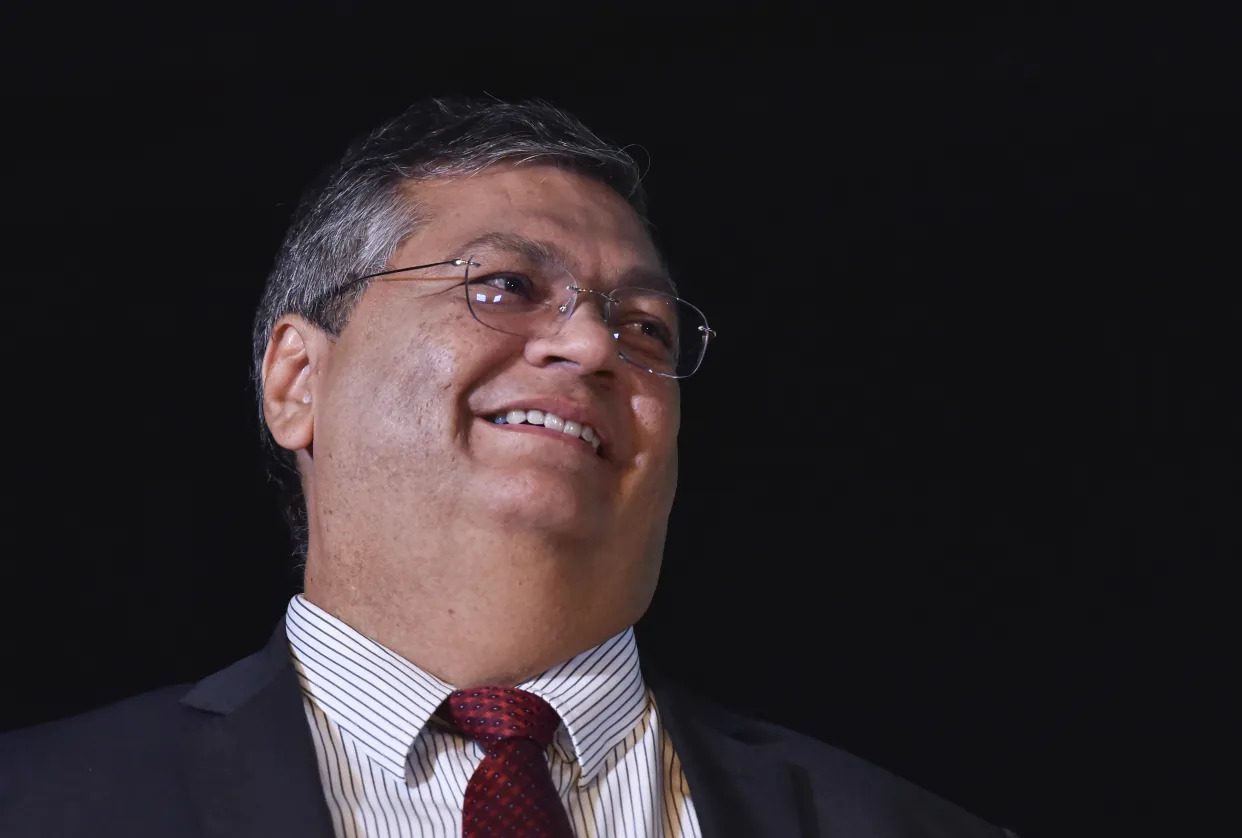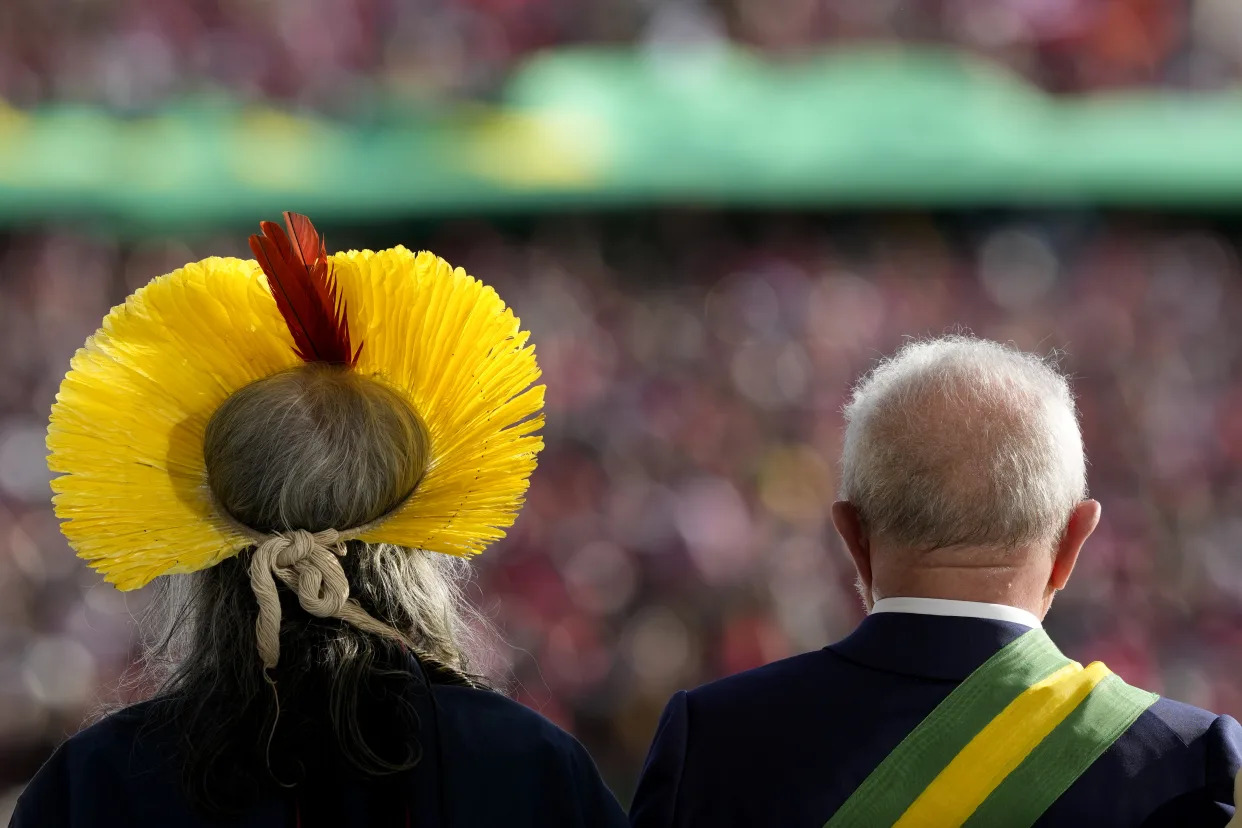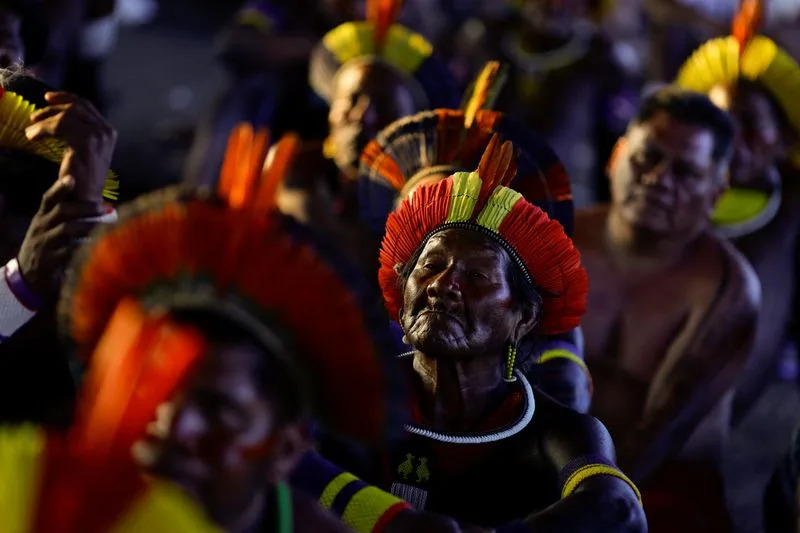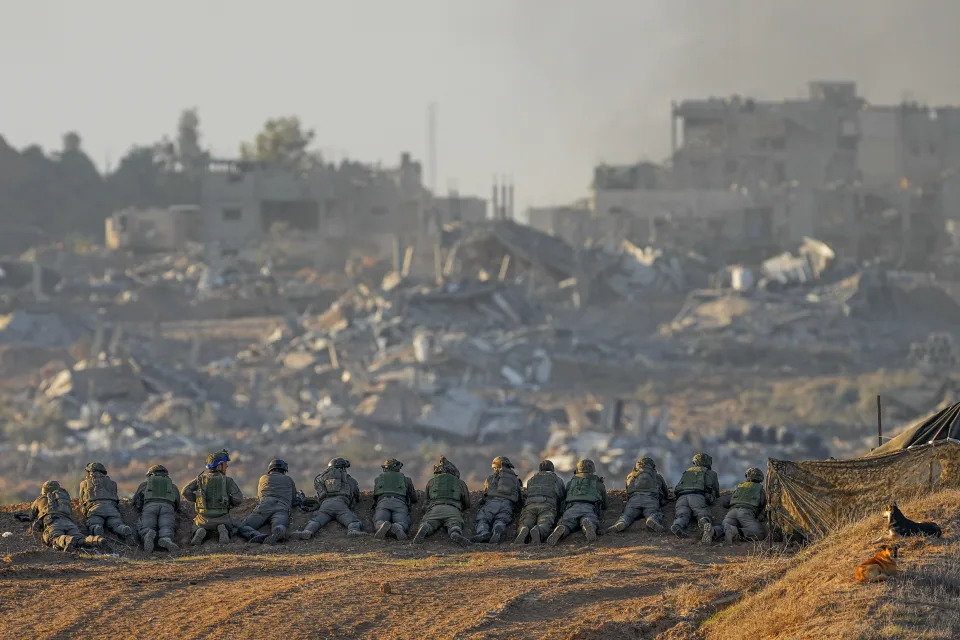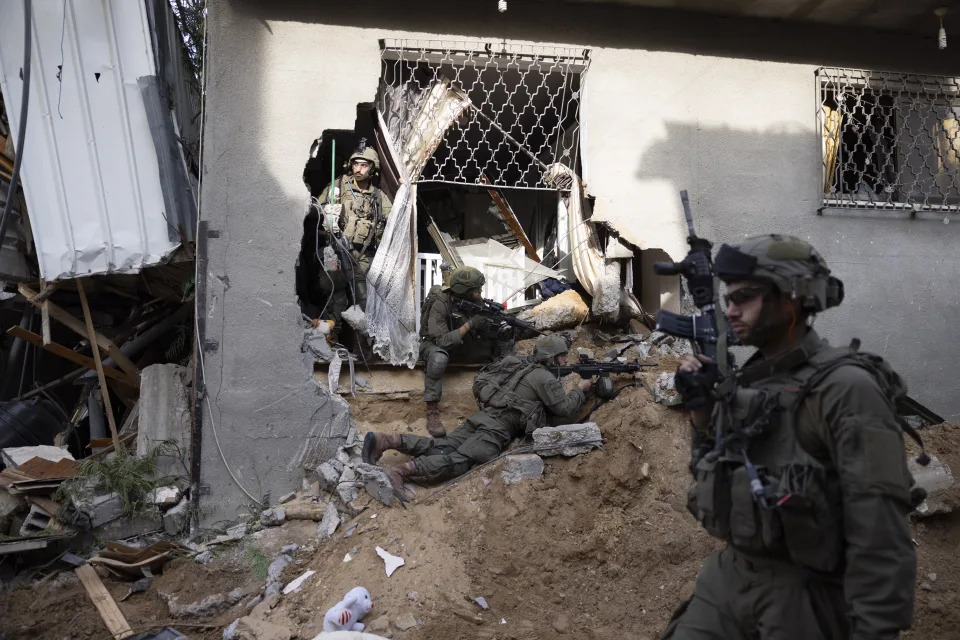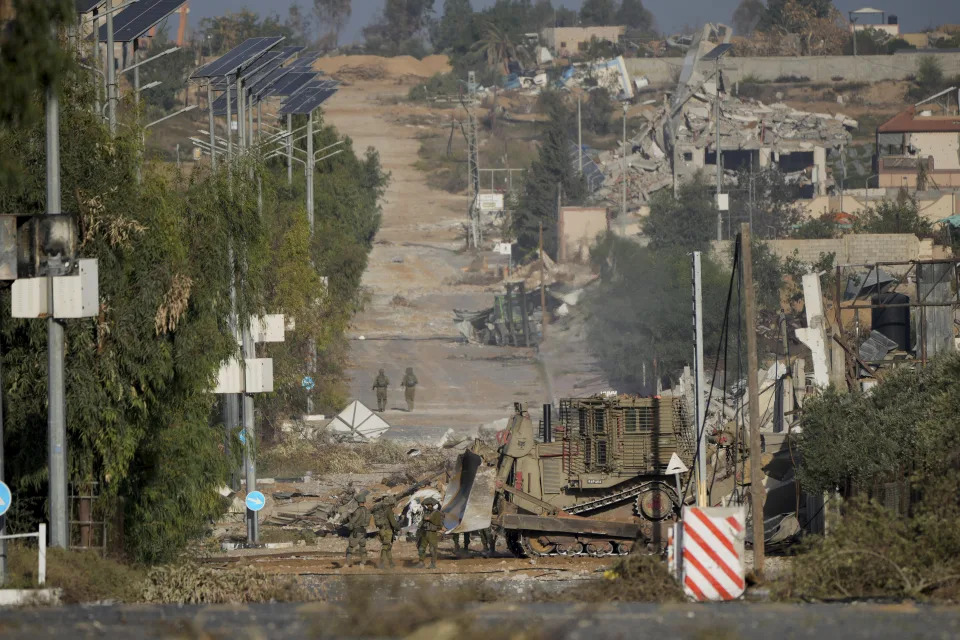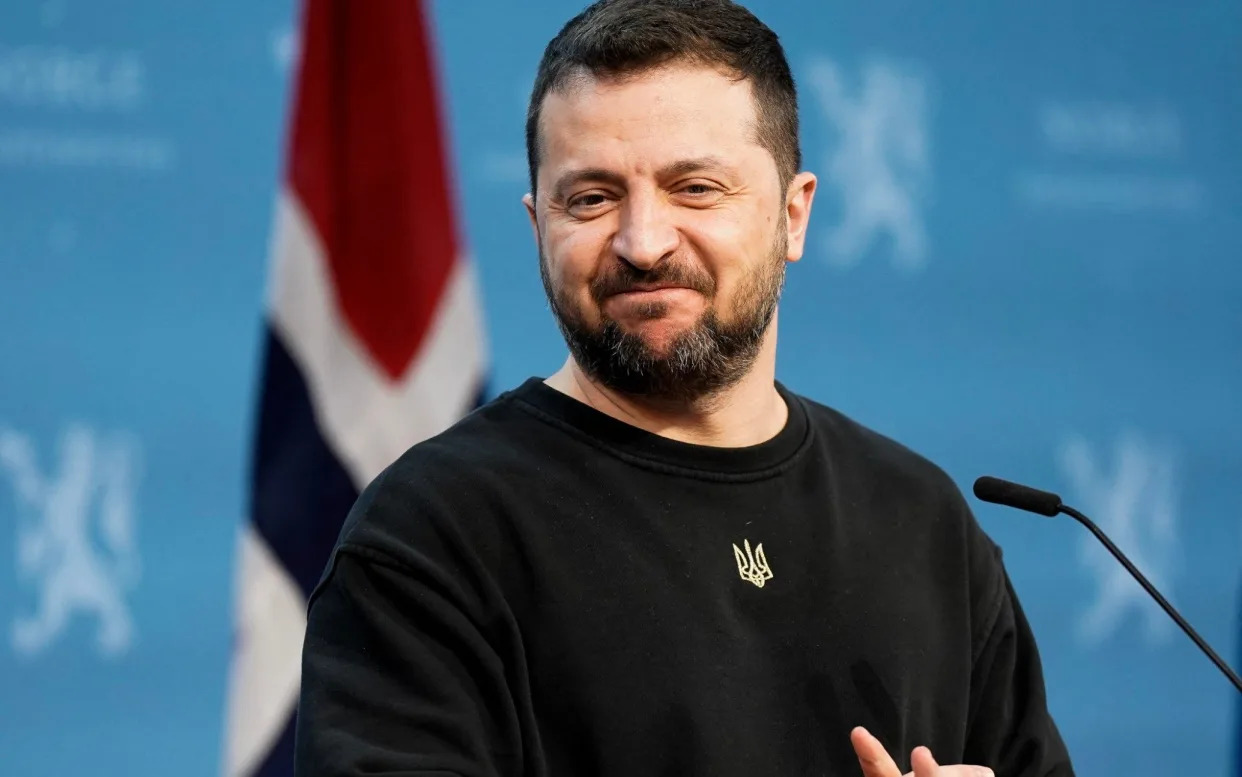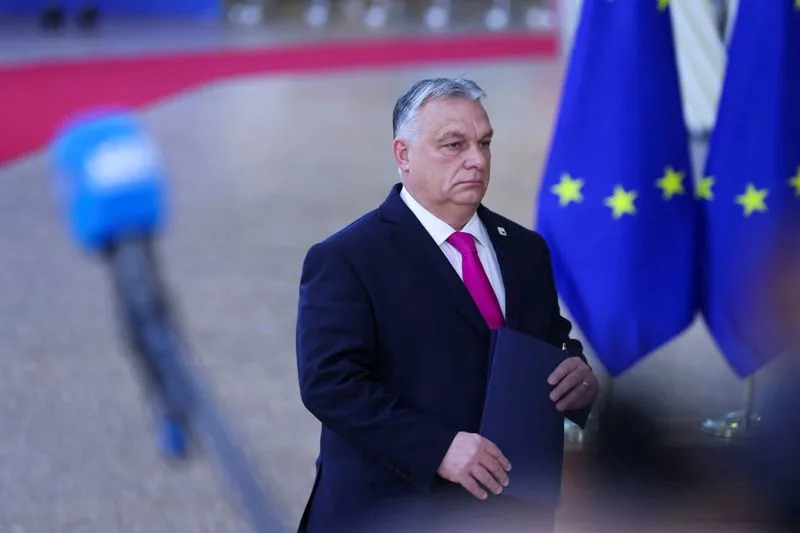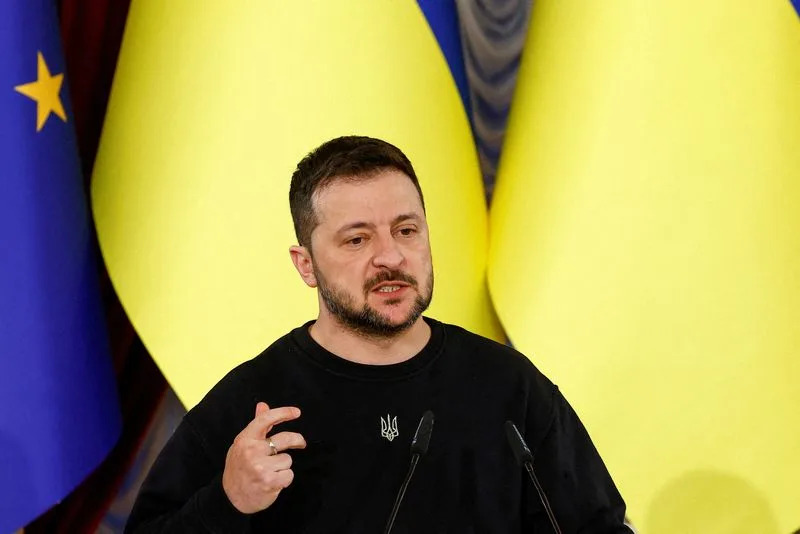Meryl Sebastian - BBC News, Kochi
Thu, December 14, 2023

Two men set off coloured smoke inside parliament while the house was in session
Fifteen Indian opposition MPs have been suspended after they protested against a security breach in the parliament.
At least four people were arrested after two intruders shouted slogans and set off coloured smoke inside parliament. Their motive remains unclear.
The federal home ministry has ordered an investigation into the incident.
The security lapse occurred on the 22nd anniversary of a deadly attack on the parliament.
Intruders spray coloured gas in India parliament
On Thursday, a day after the breach, security was ramped up around the parliament building, with barricades outside the complex to restrict entry.
Both houses were adjourned after protests by opposition MPs who demanded a discussion on the incident and statements from the prime minister and the home minister.
In the Rajya Sabha, the upper house of the parliament, opposition MP Derek O'Brien was suspended for "ignoble conduct" after he shouted slogans demanding a statement from Home Minister Amit Shah.
In the Lok Sabha, the lower house, 14 MPs from opposition parties such as the Congress and the Dravida Munnetra Kazhagam were suspended until 22 December, when the session ends.
Before the session was adjourned, defence minister Rajnath Singh said in parliament that the incident had been condemned by "everyone". "We all - ruling and opposition MPs - have to be careful about to whom we issue the passes (to enter parliament)," he said.
Opposition leaders have demanded action against Pratap Simha, an MP from the governing Bharatiya Janata Party (BJP) who allegedly signed the passes used by the intruders to enter the public gallery in parliament.
Neither Mr Simha nor his party have officially commented. The BBC has emailed the MP for comment.
A police official told Reuters that visitor passes had been suspended until a security review was completed for the parliament building.
Reports say the four accused - three men and a woman in their 20s and 30s - will be produced in court on Thursday. Police have not officially confirmed their identities yet, but their families have been speaking to local media, and newspapers have published their photos and names.
The incident occurred on Wednesday while lawmakers were in session in the Lok Sabha, the lower house. Earlier in the day, President Droupadi Murmu, Prime Minister Narendra Modi and other leaders had paid tribute to the victims of the attack in 2001 in which nine people were killed. All five of the attackers were killed by the security forces.
MPs said two men jumped into the chamber from the public gallery and set off canisters of coloured smoke. One of the men was seen jumping from table to table as lawmakers and security officials tried to catch him.
Two others - a man and a woman - shouted slogans outside the parliament and set off coloured smoke from canisters. They were seen on video being led away by the police.
Who are the accused?
The four people who have been arrested are from different states in India - several media reports have quoted anonymous police officials who say they met on Facebook, but the BBC couldn't confirm this independently.
Some journalists outside parliament managed to speak to one of the accused as she was being led away by police. She identified herself as Neelam and said she did not belong to any organisation. She also said she was an ordinary citizen who was unemployed and wanted to protest against the government for clamping down on people.
Her family spoke to ANI news agency from their home in Jind district in the northern state of Haryana, and said that they did not know she had gone to Delhi. "All we knew was that she was in Hisar [in Haryana] for her studies," her brother said.
Neelam's family said she had several degrees, including a masters in education, but was concerned about unemployment.
"She used to tell me that she is so highly qualified but has no job, so it is better to die," her mother told ANI.

The incident occurred hours after Prime Narendra Modi and other leaders paid tribute to the victims of the 2001 parliament attack
The man she was protesting with has been identified as Amol Shinde, from Latur district in Maharashtra state. A state minister told media that Mr Shinde had spent the last few years trying to pass police recruitment tests. Police say his family did not know his whereabouts.
The two men who entered parliament are Manoranjan D from Mysore in southern Karnataka state and Sagar Sharma from Lucknow in northern Uttar Pradesh state.
Manoranjan's father Devaraju Gowda told reporters that he condemned his son's act.
"This is wrong... You can protest outside [parliament] but not do this," he said, adding that Manoranjan had an engineering degree and would rear chicken, sheep and fish on the family's land.
"He reads a lot on Vivekananda [an intellectual and philosopher]. He only wanted to do good for society, for the deprived," Mr Gowda said. The family is from the constituency of Mr Simha, the lawmaker who allegedly signed the men in.
Sagar Sharma was the man who was filmed jumping on tables in parliament. His mother Rani Sharma said he was a tuk-tuk driver in Lucknow city.
"He had left two days ago," she told ANI. "He told me that he was going with his friends for some work."
Reports say a fifth man was detained in Gurugram on the outskirts of Delhi while another man was traced to Rajasthan. Both of them have been accused of helping the four protesters.
BBC News India is now on YouTube. Click here to subscribe and watch our documentaries, explainers and features.
Read more India stories from the BBC:
The tribal Indian woman exiled for garlanding Nehru
Satellite images show Himalayan flash flood damage
When 600 US planes crashed in Himalayas in audacious WW2 mission
Indian superstar breaking boundaries with gay role
The Indian woman who transformed weather science
India police file terrorism charges against four over parliament security breach
Reuters
Thu, December 14, 2023

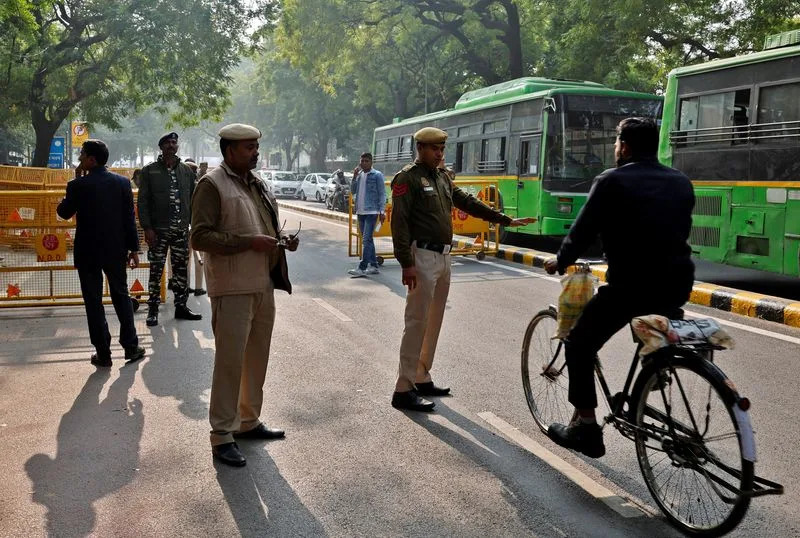
Security force personnel stand guard outside the parliament premises, in New Delhi
NEW DELHI (Reuters) - Indian police have filed terrorism charges against four people in connection with a security breach in parliament in which a man jumped into the chamber, shouted slogans and set off a smoke canister, a police officer said on Thursday.
The major security breach occurred on Wednesday, the 22nd anniversary of an attack on the parliament complex when more than a dozen people, including five gunmen, were killed.
On Thursday, opposition lawmakers shouted slogans demanding the interior minister address the incident.
"All precautions possible will be taken in future," Defence Minister Rajnath Singh told parliament, which was adjourned for a few hours on Thursday amid opposition uproar.
A parliament spokesperson said eight security personnel have been suspended in connection with the breach. India's interior ministry has launched an inquiry following a request from the parliament.
All units that manage parliament security have been called to a meeting on Thursday, a security official said on condition of anonymity.
Members of parliament told local media the man who jumped into the lower house chamber and an associate who tried to follow him had chanted slogans, including "dictatorship won't be accepted". Families of some of the four suspects told media they had expressed annoyance at not being able to find jobs for a long time.
They were charged under sections of India's anti-terror UAPA law that involve punishment for terrorist acts and conspiracies, the police officer said on condition of anonymity because they were not authorised to speak on the matter.
Om Birla, speaker of the lower house, said he would discuss with members further enhancement of security.
(Reporting by Rupam Jain, Nigam Prusty and Shivam Patel; Editing by YP Rajesh and William Mallard)
Abhijit Roy Chowdhury and Santosh Kumar
Wed, December 13, 2023
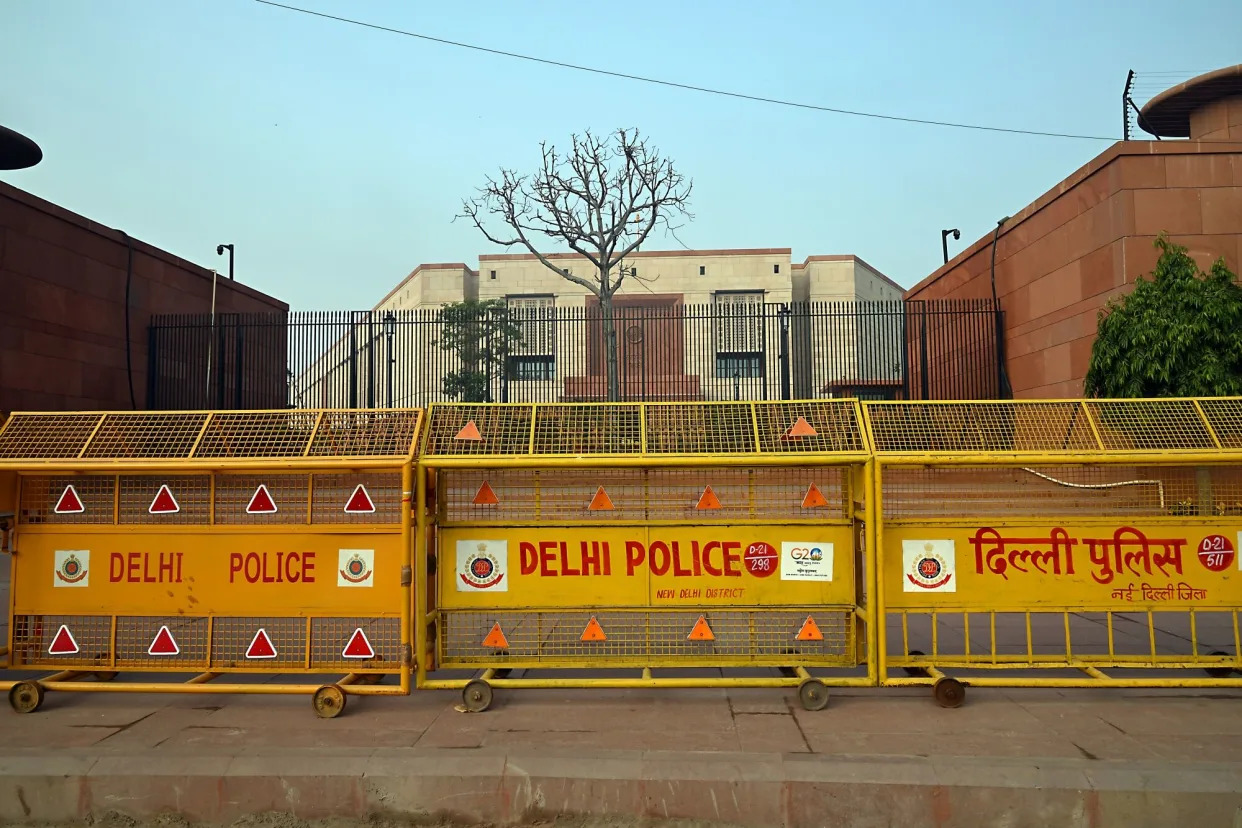
(Bloomberg) -- Two people breached the lawmakers’ area of India’s new parliament, setting off smoke cans and shouting slogans in a security breach on the anniversary of a deadly attack on the legislative complex more than two decades ago.
Two men jumped onto the house floor from the visitors’ gallery Wednesday and rushed toward the speaker’s chair in the lower house of parliament, known as the Lok Sabha, lawmakers said. Television footage showed the duo setting off cans of yellow smoke, while one of them jumped over the benches as parliament members surrounded him. Parliament was adjourned for about an hour.
Security officials detained the pair, along with two other people outside the new high-security building, according to Lok Sabha Speaker Om Birla. The Ministry of Home Affairs has opened an investigation into the parliament breach and there’s now a heavy security presence around the complex.
Indian Prime Minister Narendra Modi was not in parliament at the time. Earlier in the day, he and some other cabinet ministers paid tribute to the security personnel who were killed in a shootout in parliament on Dec. 13, 2001. India at the time blamed Pakistan-linked groups for the attack and the incident brought the two neighbors near to the brink of another war.
The security breach on Wednesday was well-coordinated and five of the six people involved have been arrested, the Press Trust of India reported, citing police officials it did not name. During the interrogation, one of the suspects said the group carried out the breach they were upset with the ethnic unrest in the remote state of Manipur and still-high unemployment in India, according to the news agency.
The two men who entered the chamber had obtained visitor passes from a lawmaker from Modi’s Bharatiya Janata Party on the pretext of visiting the new parliament complex that was inaugurated in May, local media said. One of the men was known to the lawmaker as he was from his constituency and would often visit his office, according to the reports.
PTI said one of the suspects arrested outside the parliament complex had shouted to reporters that she and her accomplices were fighting for their rights. “We do not belong to any organization. We are students and we are unemployed,” she said.
--With assistance from Swati Gupta.
Security breach at India’s parliament on 22nd anniversary of deadly attack

Wed, December 13, 2023
Two unidentified men stormed the lower house of India’s parliament on Wednesday, in a major security breach that fell on the anniversary of a deadly attack on the complex more than two decades ago.
Video broadcast live on Sansad TV, the official channel for the country’s parliament, showed a man jumping over tables and running toward the speaker’s chair as panicked lawmakers tried to subdue him.
Another man standing in the visitor’s gallery was seen spraying yellow smoke inside the building.
The parliament’s session was briefly adjourned as lawmakers made their way outside.
Two more people outside the building were seen chanting slogans as police gathered around them.
All four people have been arrested and their belongings have been confiscated, Om Birla, the speaker of parliament’s lower house, told lawmakers as parliament resumed.
Opposition lawmakers raised their concerns over the security breach.
“The issue is very serious,” said Mallikarjun Kharge, the leader of India’s main opposition Congress party. “This is about how two people were able to come inside despite such elaborate security and cause a security breach.”
Another Congress lawmaker K.C. Venugopal said the incident was “extremely troubling.”
“I am glad there was no major injury or damage done to anyone,” he wrote on X, formerly Twitter. “Parliament is among the most high-security buildings of our country. Such a major security lapse is unacceptable. We demand answers from the Home Ministry and there must be a thorough review of the security arrangements in the new Parliament building.”
CNN has reached out to Delhi police for a statement.
India’s parliament was attacked by gunmen on December 13, 2001, who killed more than a dozen people. New Delhi blamed Pakistan-linked terror groups for that attack, plunging relations further and pushing the two nuclear-armed nations to the brink of war.
India’s Prime Minister Narendra Modi paid tribute to the people who lost their lives in that incident earlier Wednesday.
“Today, we remember and pay heartfelt tributes to the brave security personnel martyred in the Parliament attack in 2001. Their courage and sacrifice in the face of danger will forever be etched in our nation’s memory,” he wrote on X.
BBC
Wed, December 13, 2023

India's parliament witnessed chaotic scenes after at least two men intruded into the chamber, shouting slogans and spraying coloured gas.
Images show MPs and security officials trying to catch one of the intruders, who is seen jumping from table to table.
Reports say the men were overpowered by security officials and taken away.
The security breach occurred on the 22nd anniversary of a deadly militant attack on India's parliament.
Lawmakers said the two men jumped into the well of the house from the visitors' gallery. Their motive is not clear.
The incident occurred while lawmakers were in session in the Lok Sabha, the lower house of India's parliament. Both houses were suspended for a short period before the session resumed.
"We are investigating the matter and have asked Delhi Police to join the inquiry," Lok Sabha speaker Om Birla said. He added that according to the preliminary investigation, the smoke sprayed in the house appeared to be "harmless".
Two other people - a man and a woman - have also been detained for protesting outside the parliament by setting off canisters of coloured gas. They were pictured being led away by police.
"Two people jumped from the public gallery and there was smoke. There was chaos all around. Both of them were overpowered by security officials," lawmaker Danish Ali told reporters outside parliament.
The breach occurred on the 22nd anniversary of a deadly attack on India's parliament, in which 14 people, including five of the attackers, were killed.
Earlier in the day, President Droupadi Murmu, Prime Minister Narendra Modi and other leaders had paid tribute to the victims of the attack.
Karti Chidambaram, an MP from the Congress party, said he was waiting for his turn to speak when chaos broke out.
"Suddenly, it appeared that one person had fallen down from the visitors' gallery. Then we realised that it was a deliberate act of him jumping into the well. There was another person, both of them pulled out canisters which were emitting yellow smoke," he said.
